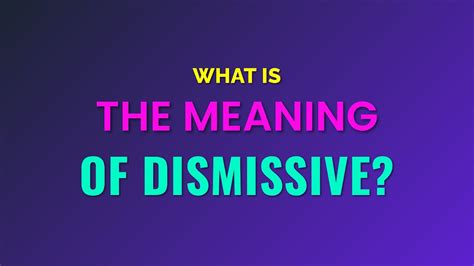The concept of dismissive behavior or attitude refers to the act of rejecting, ignoring, or belittling someone’s feelings, thoughts, or experiences without fully considering or acknowledging their validity. Dismissive behavior can be overt, such as bluntly telling someone their feelings are unimportant, or it can be more subtle, like changing the subject or making light of someone’s concerns. This type of behavior is often associated with a lack of empathy or a failure to validate the other person’s emotional state.
Impact of Dismissive Behavior
Dismissive behavior can have significant negative impacts on relationships and an individual’s emotional well-being. When someone’s feelings or thoughts are dismissed, they may feel unheard, unimportant, or unvalued. This can lead to feelings of resentment, low self-esteem, and a lack of trust in the relationship. Over time, dismissive behavior can erode the foundation of trust and understanding that is crucial for healthy communication and connection.
Forms of Dismissive Behavior
Emotional Dismissal: This involves minimizing or denying someone’s emotions. For example, telling someone “don’t be sad” or “it’s not that bad” without acknowledging their emotional experience.
Intellectual Dismissal: This is about dismissing someone’s thoughts, opinions, or beliefs without consideration. It can manifest as interrupting, talking over someone, or making them feel their perspective is unworthy of discussion.
Behavioral Dismissal: This form of dismissal involves ignoring or minimizing someone’s actions or behaviors. It can be seen in ignoring someone’s requests, not following through on commitments, or acting as if someone’s efforts are not significant.
Recognizing Dismissive Behavior
Recognizing dismissive behavior is the first step towards addressing it. Signs of dismissive behavior can include:
- Frequently interrupting others
- Making light of someone’s feelings or concerns
- Ignoring or avoiding discussions about certain topics
- Minimizing the importance of someone’s achievements or efforts
- Changing the subject to avoid dealing with someone’s emotions or concerns
Consequences of Chronic Dismissive Behavior
Chronic dismissive behavior can lead to several negative consequences, including:
- Strained Relationships: Continuous dismissal can lead to feelings of resentment and frustration, damaging the relationship over time.
- Emotional Suppression: Individuals who are frequently dismissed may suppress their emotions, leading to internal conflict and potentially harmful emotional or psychological outcomes.
- Lack of Personal Growth: Dismissive environments can stifle personal growth by discouraging open communication and honest expression of feelings and thoughts.
Overcoming Dismissive Behavior
Overcoming dismissive behavior requires effort and commitment from all parties involved. Key strategies include:
- Active Listening: Making a genuine effort to hear and understand the other person’s perspective.
- Empathy: Trying to see things from the other person’s point of view and acknowledging their feelings.
- Open Communication: Encouraging a safe and respectful environment where everyone feels valued and heard.
- Feedback: Receiving and giving constructive feedback in a non-judgmental way.
By recognizing the signs of dismissive behavior and working towards a more empathetic and validating communication style, individuals can foster healthier, more supportive relationships and environments.



